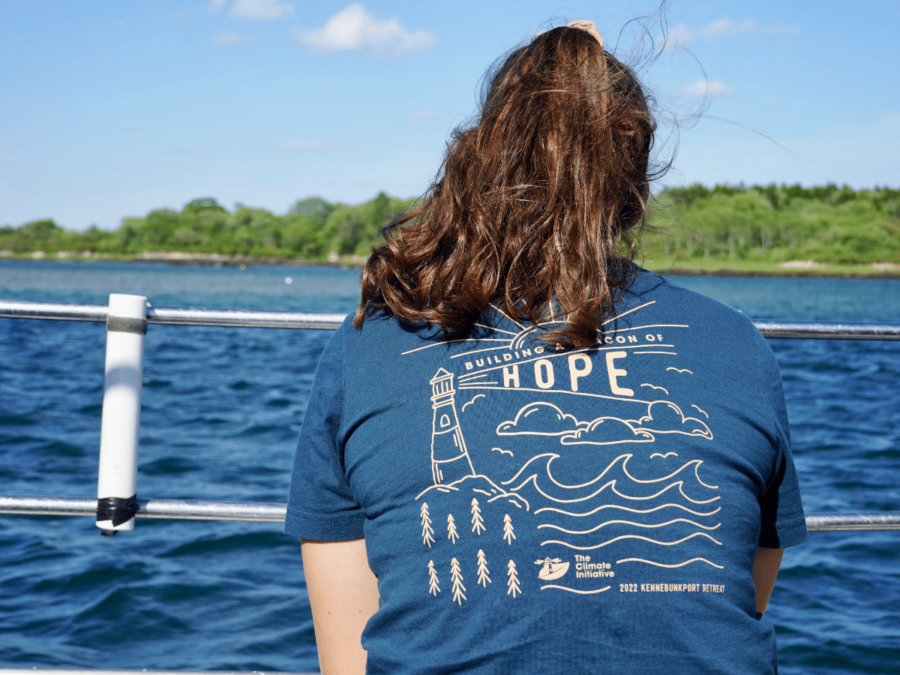TCI Reflections: A Year in Themes
By TCI Fellow Megan Birnbaum
Hi, Megan here. Just over a year ago I joined TCI’s team as a social media content creator, and I now have the great privilege of continuing on with TCI as a Youth Engagement and Policy Fellow. As I reflect on these past 12 months, it’s impossible to summarize the relationships I’ve made and the work I’ve gotten to be a part of – so instead, I’m sharing three key themes that keep re-emerging in powerful ways in the work that I get to do.

Checking out the coast of Kennebunkport with the TCI staff last June
1. We get to define success in ways that empower instead of discourage.
Recently I got to attend and help organize TCI’s annual Collegiate Climate Policy Institute (CCPI). Our programming included bringing in speakers from across the environmental field. When asked how they define success, our youth climate advocate speakers responded with a shared sentiment – success means that movements are built, that relationships are strengthened, and that the needle is pushed forward on addressing urgent climate issues. Though it would certainly be ideal if all climate-forward and environmental-justice-focused policies and practices could be immediately passed and implemented, we cannot always tie our success to legislative processes that are, to some degree, outside of our control. While we work to demand and enact policy change, success means building community and connecting across our shared humanity to build resilience in the face of an uncertain future.
On a smaller scale, over the past year, my definition of “success” in the climate space on social media has, necessarily, shifted. I came into my role, which was primarily focused on growing TCI’s TikTok presence, with ambitious goals of reaching thousands and thousands of folks through the app. I quickly learned – due to the indiscernible TikTok algorithm, fast-moving trends, and a number of other factors – that I could not simply define success by a numerical follower count. In reality, success in the social media space echoes what climate advocates at CCPI shared: building and strengthening relationships. Over this last year I’ve had the opportunity to connect with folks like Ranjani Prabakhar, whose music on the climate crisis captures both the grief and the joy of the living in today’s world; Dezz McGill, whose energetic presence and carefully crafted content on social media make climate action irresistible; Kristy Drutman, whose thoughtful contributions continue to shape TCI’s Climate Justice & Equity Learning Lab, and who has truly emerged as a thought leader in environmental justice spaces; and so many others. Success does not have to mean “going viral” – rather, it means using the vehicle of the internet to mobilize others to climate action, to share invaluable climate stories and resources, and to strengthen our communities.
2. Climate grief is palpable and heavy. And maybe that is ok.
Hear me out on this one. When I have been together in spaces with other folks in the climate field, from a gathering of youth climate leaders in Maine last year, to CCPI this year, and everywhere in between, I have noticed that, along with the passion for climate action that unites us, there is also a tangible sense of grief – for land, livelihoods, and stability lost to climate impacts. If we are not careful, this grief can shut us down. However, over the last year, I have also seen youth climate advocates use their lived experience of climate disasters and losses to propel them in their action and in making real change in their communities. Loss is deeply connected to love – for our communities, or landscapes, our Earth. Many of us have heard the quote that “grief is just love with no place to go.” Climate action – and any action after loss, for that matter, gives fierce love a place to go. Engaging with grief allows us to tap into love; love fuels us to tap into action; action lets us survive grief and makes us resilient against forces who fail to prioritize a livable climate future. Grief does not detract from the climate movement; rather, it connects us and strengthens collective efforts. This is why we need to feel our way through; this is why, in the face of grief, we can say “we can still find a way to be ok.” In the words of an article I read recently: “in a weird twist of cosmic laws, grief itself makes us big enough to survive grief.”
I want to be clear when I talk about this “ok-ness.” Climate impacts are neither distributed, nor felt, evenly. In just one example of these injustices, practices such as redlining have forced many marginalized people, especially Black folks, to live in environmentally hazardous areas – less equipped to face climate disasters such as extreme storms. These are egregious realities that have never been ok, nor justifiable, and we should be angry and actively fight for clean air, safe water, fresh food, access to nature, resilience against climate disasters, and so much more, for all – and especially alongside those in communities made most vulnerable by decades of abuse and abandonment by those in power. The question is, how can we feel our way through grief enough to survive it; enough to return to this urgent and vital fight, again and again and again.
“Loss is deeply connected to love – for our communities, or landscapes, our Earth. Many of us have heard the quote that “grief is just love with no place to go.” Climate action – and any action after loss, for that matter, gives fierce love a place to go.”
3. Connecting the dots of climate change is a superpower
While seemingly disparate issues, worsening wildfires in California, devastating hurricanes in Florida, and extreme temperatures in Texas are all connected by climate change. When I first deeply understood this reality, things felt incredibly overwhelming – these challenges vary widely and require a major breadth and depth of responses. I have also come to realize, however, that there is hope in this, too: policies and practices that mitigate greenhouse gas emissions and slow the warming of our planet can help us mitigate, or at least adapt, to a wide range of climate impacts. At CCPI last month, as participants shared their climate stories, it struck me: if we were to treat climate impacts as disconnected, traumatic events, our response upon hearing these stories might be something along the lines of “I am so sorry that happened to you.” But instead, we can say “the fires in your backyard are exacerbated by the same climate crisis that is causing sea levels to rise in my community; these crises are perpetrated by the same actors.” In this sense, we transform this fact – that the effects of climate change are widespread, varied, and severe – from a threat into a superpower. We connect our stories and come together to build power and resilience.
Want to dive deeper into climate action today? I recommend starting at our Toolkits and Learning Lab. And I am always around for direct questions at my email below! I am feeling grounded in gratitude for my TCI team, and hope for our collective future.

Megan Birnbaum (she/her)
The Climate Initiative Youth Engagement and Policy Fellow
megan@theclimateinitiative.org
